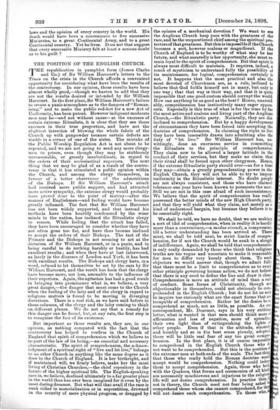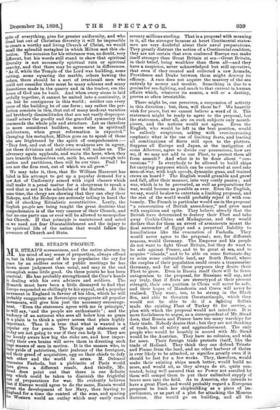THE POSITION OF THE ENGLISH CHURCH. T HE republication in pamphlet
form (James Clarke and Co.) of Sir William Harcourt's letters to the Times on the crisis in the Church affords a convenient opportunity for considering what have been the results of the controversy. In our opinion, those results have been almost wholly good,—though we hasten to add that they are not the results desired or intended by Sir William Harcourt. In the first place, Sir William Harcourt's failure to create a panic atmosphere as to the dangers of "Roman- ising," and to make the public red-hot for a new Act of Uniformity, has been patent. However indignant moderate men may be—and not without cause—at the excesses of certain extreme Ritualists, it is clear that they see those excesses in their true proportion, and have not the slightest intention of blowing the whole fabric of the Church up with gunpowder because certain defects are visible in a corner of one of the aisles. The mistake of the Public Worship Regulation Act is not about to be repeated, and we are not going to send any more clergy- men to prison, even though they may be stubbornly unreasonable, or grossly insubordinate, in regard to the orders of their ecclesiastical superiors. The next thing that we may be glad of as a result of the contro- versy is that it has stimulated a public opinion within the Church, and among the clergy themselves, in -favour of a better observance of the admonitions -of the Bishops. If Sir William Harcourt's attack -bad received more public support, and had attracted more active sympathy, the extreme clergy would probably have proved dour to the point of mutiny—after the wanner of Englishmen—and feeling would have become greatly inflamed. The fact that Sir William Harcourt has not been widely supported, and that instead his methods have been heartily condemned by the wiser minds in the nation, has inclined the Ritualistic clergy to reason. While feeling that the attack has failed, they have been encouraged to consider whether they have not often gone too far, and have thus become inclined to accept the orders of their Bishops. The tact of the Primate and the Bishops in not seeming to act at the Zictation of Sir William Harcourt, or in a panic, and in being careful to do nothing harshly or hastily, has had excellent results ; and when they have at last intervened, as lately in the dioceses of London and York, it has been with excellent results. The Bishops and clergy have, in a word, refused to let themselves be set by the ears by Sir William Harcourt, and the result has been that the clergy have become more, not less, amenable to the influence of -their superiors. Again, the agitation has had a good result in bringing into prominence what is, we believe, a very great danger,—tbe danger that must come to the Church when the feeling of the laity and of the clergy in regard to religious matters is found to be moving in diverging -directions. There is a real risk, as we have said before in these columns, of the clergy and the laity coming to think .on different planes. We do not say that a remedy for this danger can be found, but, at any rate, the first step is to recognise the fact of its existence.
But important as these results are, they are, in our -opinion, as nothing compared with the fact that the controversy has helped to confirm in the Church of England that spirit of comprehension which we believe to be part of the law of its being,—an essential and necessary characteristic. The spirit of comprehension, the acknow- ledgment of a spiritual right of "live and let live," belongs to no other Church in anything like the same degree as it does to the Church of England. It is her birthright, and if maintained will, we firmly believe, make her the most living of Christian Churches,—the chief repository in the future of the higher spiritual life. The English-speaking race is, we believe, destined ultimately to a far greater place in the world than has ever been imagined for it even by the most daring dreamer. But what will that avail if the race is sunk either in materialisation or in superstition, drowned an the security of mere physical progress, or drugged by the opiates of a mechanical devotion P We want to Bee the Anglican Church keep pace with the greatness of the race, and be the unquestioned chief among the spiritual pro.. tectorsof that greatness. But this is impossible if the Church becomes a sect, however zealous or magnificent. If the Church of England is to be worthy of what may be her future, and what assuredly is her opportunity, she must re- main loyal to the spirit of comprehension. But that spirit is always most difficult to maintain. It requires, indeed, a touch of mysticism to understand fully the possibility of its maintenance, for logical, comprehension certainly is not. It happens that the most practical and also the most devoted of Churchmen are, as a rule, inclined to believe that God fulfils himself not in many, but only is one way ; that that way is their way, and that it is quite impossible that one good custom should corrupt the world, How can anything be as good as the best? Hence, unavoid- ably, comprehension has instinctively many eager oppoti. ents. Especially is this true of what is for the time by far the most active and zealous and living part of the Anglican Church,—the Ritualistic party. Naturally, they are dis. inclined to comprehension. But by a happy development of circumstances they have been forced into accepting the doctrine of comprehension. In claiming the right to live they have been insensibly drawn into admitting also the duty of "let live." Sir William Harcourt has, un- wittingly, done an enormous service in committing the Ritualists to the principle of comprehension. They claim now to be allowed a larger latitude in the conduct of their services, but they make no claim that their ritual shall be forced upon other clergymen. Hence, if the extreme Ritualistic party should ever—as for a time they may—obtain a greatly preponderating power in the English Church, they will not be able to try to impose uniformity in the Ritualistic interest. No doubt people are not always consistent, and those who have claimed tolerance one year have been known to persecute the next. Still we are not in this case afraid of such inconsistency. We believe that the spirit of comprehension has really possessed the better minds of the new High-Church party, and that they will yield what they claim, not merely as a kind of understood bargain, but because they believe it to be essentially right.
We shall be told, we have no doubt, that we are making a sort of idol of comprehension, when in reality it is hardly more than a convenience,—a mod= vivendi, a compromise, till a better understanding has been arrived at. There must, we shall be told next, be strict limits of compre- hension, for if not the Church would be sunk in a slough of indifference. Again, we shall be told that comprehension is only really demanded by those who think that religions truths are too vague and uncertain to make it reasonable for men to differ very keenly about them. To such objectors we would answer that, though we admit fully that there must be a limit to comprehension as to every other principle governing human action, we do not believe that there is any need to define the line and draw it close. Comprehension is more an attitude of mind than a rule of conduct. Some forms of Christianity, though not objectionable in themselves, could not obviously be com- prehended in the English Church ; but do not let us seek to inquire too curiously what are the exact forms that are incapable of comprehension. Rather let the desire be to comprehend as much, not as little, as possible. As our correspondent, Mr. Dearmer, says in his very striking letter, what is wanted is that men should think more of affirmation and less of negation, more of spreading their own light than of extinguishing the lights Of other people. Even if that is the attitude, sincerely and humbly and so in the best sense piously, adopted, there will be little real fear of any too great compre hension. In the first place, it is of course impossible to comprehend in the English Church those who do not want to be comprehended. But this is the position. of the extremer men at both ends of the scale. The last thing that those who really hold the Roman doctrine would accept would be comprehension. Nothing could induce them to accept comprehension. Again, those who hold, with the Quakers, that forms and ceremonies of all .kind' are necessarily mischievous and injurious to the religion life will not desire comprehension. In practice then, not in theory, the Church need not fear being asked comprehend those whom she cannot comprehend, for a will, nob desire such comprehension. To those who; spite of everything, pine for greater uniformity, and who dread lest out of Christian diversity it will be impossible to create a worthy and living Church of Christ, we would recall the splendid metaphor in which Milton met this ob- jection. The occasion for his utterance was, no doubt, very different, but his words still stand to show that spiritual diversity is not necessarily spiritual ruin or spiritual anarchy, and that there may be agreement in differences. "As if, while the Temple of the Lord was building, some cutting,. some squaring the marble, others hewing the cedars, there should be a sort of irrationall men who could not consider there must be many schisms and many disseotions made in the quarry and in the timber, ere the house of God can be built. And when every stone is laid artfully together, it cannot be united into a continuity, it can but be contiguous in this world ; neither can every peece of the building be of one form ; nay rather the per- fection consists in this, that out of many moderat varieties and brotherly dissimilitudes that are not vastly dispropor- tionall arises the goodly and the gracefull symmetry that commends the whole pile and structure. Let us therefore be more considerat builders, more wise in spirituall architecture, when great reformation is expected." Changing his metaphor, Milton goes on to speak of those who are frightened by the spirit of comprehension :— "They fret, and out of their own weakness are in agony, lest these divisions and subdivisions will undoe us. The adversary again applauds, and waits the hour, when they have brancht themselves out, saith he, small anough into parties and partitions, then will be our time. Fool ! he sees not the firm root, out of which we all grow."
We may take it, then, that Sir William Harcourt has failed in his attempt to get up a popular demand for a new Act of Uniformity armed with rigid clauses which shall make it a penal matter for a. clergyman to speak a word that is not in the schedules of the Statute. At the same time, the clergy are showing that they can obey their Bishops, and the Bishops are seriously taking in hand the task of checking Ritualistic eccentricities. Lastly, the English people are being taught the great doctrine that comprehension is of the very essence of their Church, and that no one party can or ever will be allowed to monopolise that Church. If that principle is maintained and acted on we need not fear Disestablishment and the injury to the spiritual life of the nation that would follow the severance of Church and State.







































 Previous page
Previous page